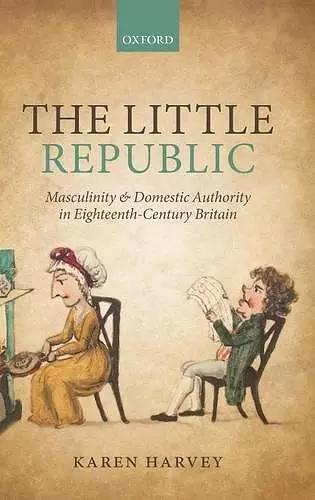The Little Republic
Masculinity and Domestic Authority in Eighteenth-Century Britain
Format:Hardback
Publisher:Oxford University Press
Published:19th Apr '12
Currently unavailable, and unfortunately no date known when it will be back

Part of the OAPEN-UK project
Reconstructs the distinctive relationship between the house and masculinity in the eighteenth century; adds a missing piece to the history of the home, uncovering the hopes and fears men had for their homes and families. Reveals how the public identity of men has always depended, to a considerable extent, upon the roles they performed within doors.This is an open access title available under the terms of a CC BY-NC-ND 3.0 International licence. It is free to read at Oxford Scholarship Online and offered as a free PDF download from OUP and selected open access locations. The relationship between men and the domestic in eighteenth-century Britain has been obscured by two well-established historiographical narratives. The first charts changes in domestic patriarchy, founded on political patriarchalism in the early modern period and transformed during the eighteenth century by new types of family relationship rooted in contract theory. The second describes the emergence of a new kind of domestic interior during the long eighteenth century, a 'home' infused with a new culture of 'domesticity' primarily associated with women and femininity. The Little Republic shifts the terms of these debates, rescuing the engagement of men with the house from obscurity, and better equipping historians to understand masculinity, the domestic environment, and domestic patriarchy. Karen Harvey explores how men represented and legitimized their domestic activities. She considers the relationship between discourses of masculinity and domesticity, and whether there was a particularly manly attitude to the domestic. In doing so, Harvey suggests that 'home' is too narrow a concept for an understanding of eighteenth-century domestic experience. Instead, focusing on the 'house' foregrounds a different domestic culture, one in which men and masculinity were central. Reconstructing men's experiences of the domestic as shaped by their own and others' beliefs, assumptions and expectations, Harvey argues for the continuation of a model of domestic patriarchy and also that effective domestic patriarchs remained important to late-eighteenth-century political theory. It was a discourse of 'oeconomy' - the practice of managing the economic and moral resources of the household for the maintenance of good order - that shaped men's attitudes towards and experiences in the house. Oeconomy combined day-to-day and global management of people and resources; it was a meaningful way of defining masculinity and established the...
In The Little Republic, Karen Harvey successfully situates men at the heart of 18th-century households. Subverting a succession of tired stereotypes about the exclusive femininity of the domestic sphere, her richly researched volume sheds much new light into the dark corners of the Georgian home. Taking into account both theories of domestic economy and material practices of daily life, Harvey presents us with a new and compelling account of British masculinity at the cusp between early modern and modern times. * Margot Finn, University College London *
a stimulating work of originality, analysing the relationship between men and the domestic household in the eighteenth century. ... The book breaks new ground. * Northern History *
This is a book based on diligent research and careful thought. It painstakingly recreates the daily practice of a hitherto rather neglected aspect of eighteenth-century masculinity, and reconstructs the eighteenth-century middle-class household as the joint, complementary domain of men and women. * Faramerz Dabhoiwala, English Historical Review *
ambitiously undertake to bring clarity to what is a still rather muddled history of men and manhood. They succeed admirably. * James Rosenheim, American Historical Review *
ISBN: 9780199533848
Dimensions: 241mm x 166mm x 19mm
Weight: 526g
232 pages